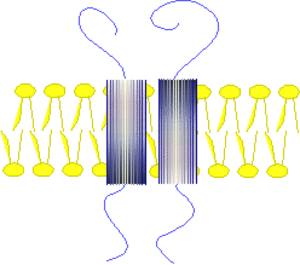Membrane fusogene peptides
Protein/protein-interactions are of paramount importance for understanding functional networks in the cell. Although membrane proteins represent only ca. 30% of all gene products, their structural characterization lags behind that of soluble proteins. Membrane proteins usually exist as oligomeric complexes - their formation requires the existence of specific interactions between the individual components. Our interest focuses on protein/protein-interactions relevant for maintaining quaternary structure and function of integral membrane protein complexes. More specifically, we investigate the role of membrane-spanning domains, i.e. of transmembrane segments (TMSs) in this context.
One focus of the laboratory is the in vitro evolution of membrane-spanning interaction domains based on the ToxR/POSSYCCAT system which is a tool to investigate interactions between transmembrane segments. The aim of this project is to understand the relationship between transmembrane segment sequence and interaction. Further, this approach allows us to predict the existence of TMS-TMS interactions.
Another focus is the investigation of the structure/function relationships of fusogenic proteins and peptides - molecular machines that drive the regulated fusion of biological membranes. In this context, we analyze assembly of SNARE proteins in vitro and correlate the results with functional assays of SNARE proteins in yeast. Further, we investigate the structural and functional properties of fusogenic peptide mimics that model transmembrane domains of fusogenic proteins.
